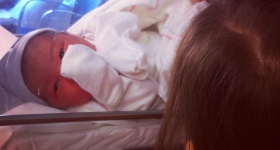No question, the biggest privilege of starting this column has been the connections it's enabled me to make. I doubt I'd have found Jane Chin otherwise -- and yet she's been running a website of her own, including a Mental Health Source page, since 1998! It's a brave and diligent page; she stares hard questions in the eye and does not flinch.
Before I introduce you to her, though, one plea: Can we hear from the men? Asian American women don't have dibs on depression, even if we've got more press, so gentlemen, you own this space, too.
Guest blogger Jane Chin tells us she "spent the first half of her life captive to 'not enough' and chasing success. Now she uses each day to connect to significance and to count her blessings." Adorable picture of her at the bottom of the post.
When I first started sharing my experiences publicly on a personal website, I was neutralizing one of the most powerful weapons of emotional abuse: Shame.
Shame silenced my voice without a single strike. Shame discolored my self-perception without leaving a visible bruise. Shame became a weapon I used to inflict pain on myself throughout childhood.
Because of shame, I learned to become my own best perpetrator. I criticizing myself for anything and everything I suspected was not perfect, belittling myself for not measuring up to my peers, and damning myself to an eternal hell of "not enough."
Shame gets its power from my silence, so I decided to reveal the shackles of emotional abuse that I learned to believe I deserved. When I shared personal stories about my childhood I sometimes felt like I was betraying my mother -- what a shameful thing to do. But I needed to get my stories out in the open because I didn't want them to poison me from the inside. I share my stories to save my life.
I get emails from visitors to my website who had read my personal stories. Many describe a sense of relief in knowing that they were not alone in having a toxic family or emotionally abusive upbringing. Some ask me questions about how they can "break free" from their personal prisons of long-term emotional abuse. It doesn't matter whether the person is a teenager in high school, a thirty-year old successful professional, or a fifty-year old parent and grandparent: I can hear the voice of the wounded children they have been, emanating through these personal stories.
One of the common questions I am asked is about "acceptance." How can I accept being born into a Toxic Family? The truth is, there's nothing I can do to "accept" what is already my reality. I spent many years resisting this reality, because I thought if I were only good enough or smart enough or successful enough, then my parents will change. Then I will be "loved as I am." This, of course, is me trying to change another person, and we know how that story ends. We can't change another person who does not want to change. We can't even change another person by changing ourselves into what that person wants us to be.
Another question I am asked is about "approval." How can I feel good about myself without my parents’ approval? The short answer is: with daily practice, and a real possibility that you will fail more often than you will succeed, at least at the beginning. At first, I felt like I was worthless 99 percent of the time because I didn't have my parents' approval. It didn't matter what I had achieved or accomplished, if my parents didn't acknowledge what I'd done or if they'd discounted me, then I might as well have crawled out from under a rock.
That one percent of the time of feeling worthwhile as a human being was a blissful respite, but it didn't last very long. But with relentless "practice" of learning to believe in the positive feedback from people whose opinions I respect, I recalibrated over time that 99 percent worthless/1 percent worthy human "ratio" to 90/10... 85/15... 75/25... 50/50... 25/75...
If I can offer the "secrets" to uncoupling my sense of worth from parental approval, these secrets are "Patience" and "Perseverance." "Success" is not a complete absence of failure in the matters of the heart, as this certainly isn't the case for me. Instead, my being "free" of the prison of emotional abuse is not about "never failing," but about succeeding "more often than" failing.
It doesn't mean I never feel upset about the relationships I've had with my parents. It doesn't mean I no longer care about what my parents think of me. Depending on my mood or the kind of day I'm having, maybe about 1-5 percent of my feeling of self-worth has anything to do with what my parents think of me. I do care what they think of me, but I no longer let this dictate what I think of myself. I do this by surrounding myself with supportive people, and counting these supportive people as part of my "blessings."
It doesn't mean I have forgotten the emotional traumas I'd felt as a child. I'm compiling notes for the personal story I'm ready to share about my journey to "reclaiming myself" and these notes take me back to the time when that child in me was hurt and angry. I can write only one page a day because that already overwhelms me emotionally for the day. Even now, more than 30 years later, I still feel the intensity of those emotional wounds that time has dulled slightly somewhat. But I don't let these wounds cripple me in everyday life.
I have come to learn that the emotional traumas of daily life may be real, but I can choose not to give it as big of a “seat” at the table of my house. For the longest time, I have given my traumatic history the biggest seat at the head of the table -- a throne, at that. Over time I've demoted my traumatic history to a progressively smaller seat at the table, to the point where it may occupy a stool in the corner of the table. It may be noticeable only to me, but it no longer interferes in my happiness, or my enjoyment of the family that I now have.
I have come to learn that I can tend to my "wounded child" but that I should honor and see the "child of light" that lives in me and in every one of us -- the light that remains forever whole and intact.

* * *
Ask a Model Minority Suicide is a Hyphen column, scheduled for every 4th Thursday. Introductory post for the column here. Resource Guide here. Go here to see all posts in this series.
Comments, questions, or stories can be posted below -- or sent privately to Sam at aamms[at]hyphenmagazine[dot]com.









Comments